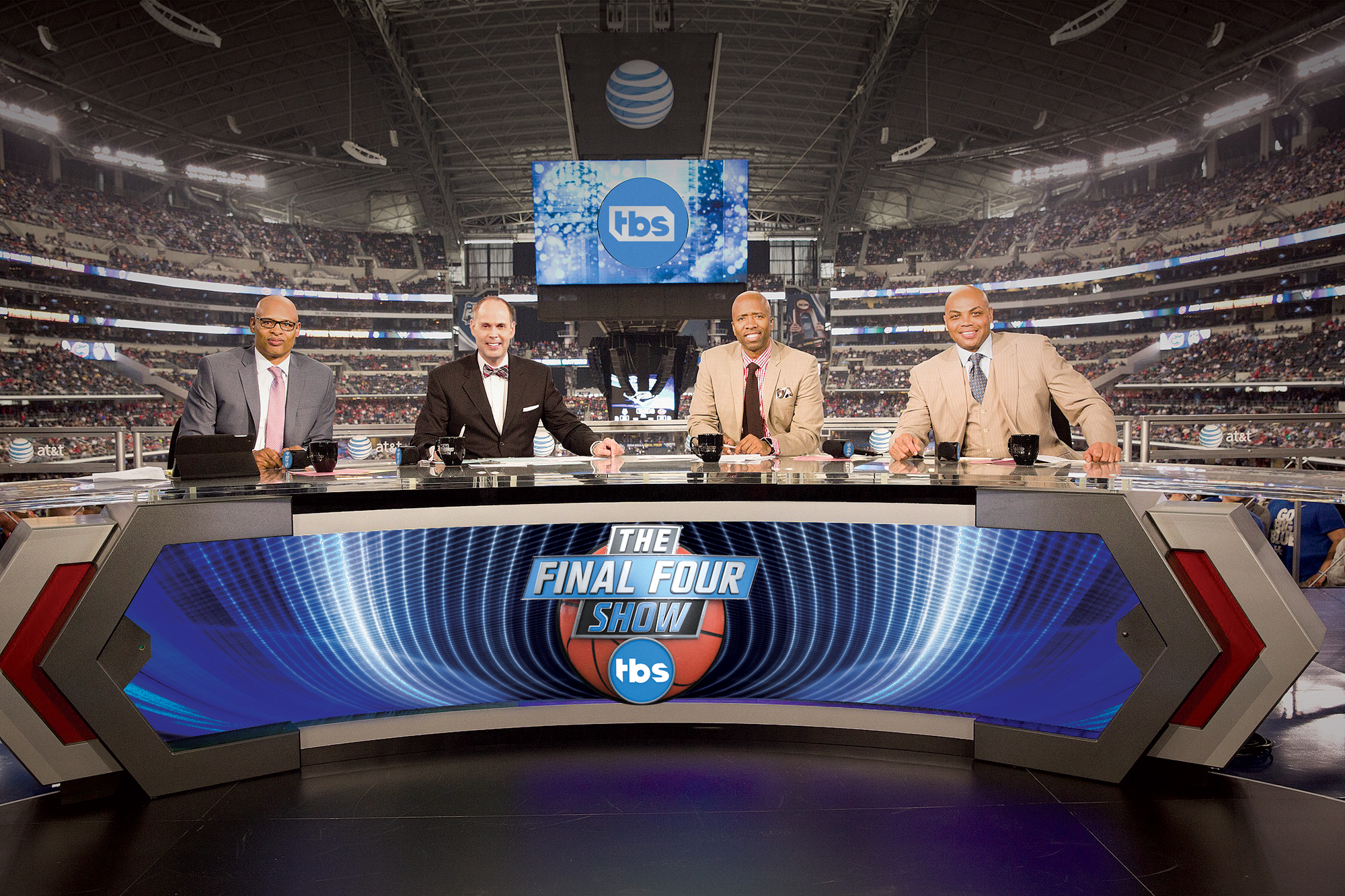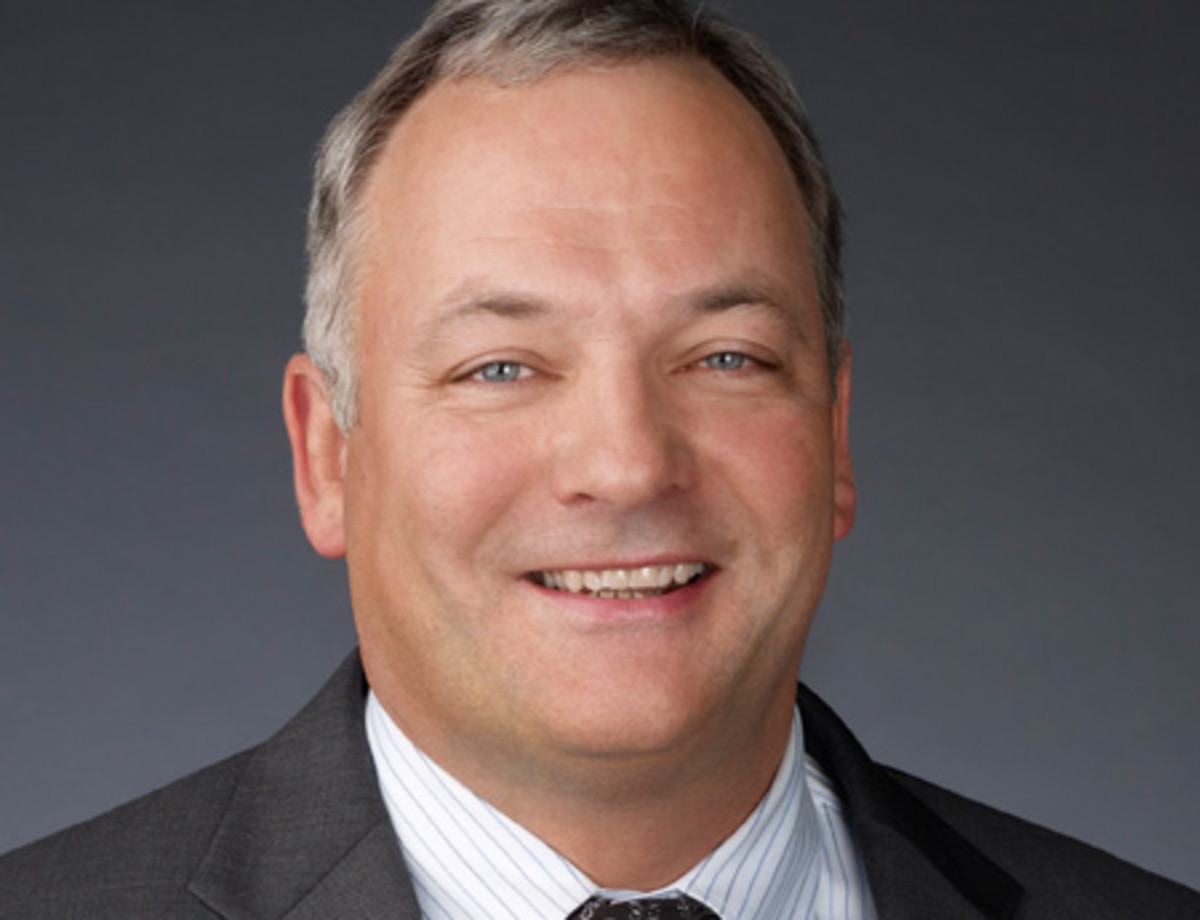Brothers in Studio: How the Relationship Between Producer Tim Kiely and Host Ernie Johnson Reshaped Modern Sports TV
Casual approach to studio programming has brought success to Turner
Story Highlights
“I could do the Resurrection of Christ in a minute and a half!!”
Those were the words that one of Tim Kiely’s bosses screamed at him one afternoon very early in his career when he had the gall to ask for 15 extra seconds on a story he was working on for the 6:00 news at a station in Pittsburgh.

Turner’s studio cast of (from left) Clark Kellogg, Ernie Johnson, Kenny Smith, and Charles Barkley will anchor TBS’s pre/postgame coverage of this weekend’s Final Four. Coverage begins at 3 p.m. ET Saturday.
A young Kiely — who today is the heralded VP, production/executive producer, Turner Sports — undoubtedly had a love of working in television, but he also had a sincere distaste for just how rigid it could be in those days. Those draconian words stuck with him and only strengthened his desire to implement his vision of what he thought television, particularly sports studio television, could be.
“From the first day, you learned about prompters, scripts, and tight editing,” says Kiely. “Everything was down to the second. I just didn’t enjoy it. It was very formulaic. That early experience made me want to look for something different.”
He envisioned television with the restraints off. He wanted to produce a show that was less about a suit robotically reading a series of 30-second scripts into a camera and more like a team bus with multiple personalities sharing captivating conversation and good-natured ribbing. It became the foundation for what would become arguably sports television’s most successful studio show in history, Inside the NBA.
But every Wes Anderson needs his Bill Murray. Enter Ernie Johnson.
“E.J.” and Tim were united in the early 1990s after Kiely moved over from ESPN to join the Turner Sports team in Atlanta. In 1989, Turner had become the latest cable-television company to make a bold splash into live sports production, acquiring the rights to begin broadcasting NBA games. Johnson, an Atlanta native, had been working as a sports anchor in the area at WSB-TV when he got the chance to make the leap to the national scene in his own backyard.
In 1990, Turner debuted a pre/postgame show to surround its on-court coverage. That show was Inside the NBA, and together Kiely and Johnson helped make it the industry gold standard for live studio shows.
“[Kiely] knows his guys really well and what certainly analysts are comfortable doing or not,” Johnson says. “He knows how to adapt and understands that you can’t be rigid in a style. He’s the Coach K [Krzyzewski] of producers.”
Turner’s approach — and the chemistry between Kiely and Johnson — has been an unequivocal hit, garnering Inside the NBA nine Sports Emmy Awards since 2001, including Best Studio Show – Daily in 2001, 2005, 2006, 2007, 2008, and 2013 and Best Studio Show – Weekly in 2011 and 2013 (it’s nominated in that category again this year). The buy-in has also paved a golden road of success for Johnson personally: he has thrice received a Sports Emmy as Outstanding Studio Host and is nominated in the category this year.
“The greatest thing about Tim as a producer is that he’s never been married to the stopwatch,” says Johnson. “He’s never been a guy who will say to you, ‘This conversation needs to be 25 seconds long’ and ‘You’ve got to hit this break right at this point.’ Tim has always been the type to say, ‘If you go over, I’ll make up the time somewhere else.’ I think he realizes the value of really good conversation and debate.”
That’s not to say it was love at first sight between Kiely and Johnson. Inside the NBA was a very different show in the early ’90s: it was more strictly a highlights-based show, and Johnson was a one-man band. There was no Shaquille O’Neal, Kenny Smith, or Charles Barkley bantering about games and laughing over goofy Photoshops late into the night.
In Kiely and Johnson’s first couple of weeks together, Kiely saw exactly what he had hoped wouldn’t play out unfold before him: Johnson was reading the prompter and methodically rolling through highlights. You couldn’t blame him; that was how sports TV worked. Kiely decided to do something bold: he shut off Johnson’s teleprompter.
“When I got [to Turner Sports], I saw in Ernie two different guys,” says Kiely. “Off camera, he had a biting sense of humor and was very funny. When he got on camera, he sounded like a guy reading a prompter. A high percentage of the best speeches you’ve ever heard are off-the-cuff. That’s what I was looking for.”
Johnson fought his way through the rest of the show (for the record: Kiely thinks that show went pretty well), but, when the lights went down, Johnson was fuming. The halls at Turner Studios were filled with the two yelling at each other. The argument made its made into the bathroom, where a frustrated Johnson fired his coffee mug into the wall, leaving shattered pieces everywhere. He went to his office, gathered his things, and went home.
Now, Johnson is widely regarded as one of the nicest people in the business, so it was a rare moment of rage from a level-headed guy. Kiely, in an attempt to smooth things over, went out and bought a new coffee mug and left it on Johnson’s desk. When Johnson arrived the next day, he opened the mug, which displayed the design of a generic newspaper want ad. Circled on the side was a listing reading “Postal Worker Wanted,” a jab at how Johnson had “gone postal” the night before.
“It made me laugh,” he says (he has the mug on his desk to this day), “and it made me think that this guy had a really great feel for what we do to make a joke about something like that. We’ve been golden ever since.”
The two have also been there to support each other off-set, most notably when Johnson was diagnosed with non-Hodgkin’s lymphoma in 2003. He continued to work for three more years before taking the time to receive treatment. In October 2006, he resumed his duties as host for Inside the NBA while continuing his chemotherapy.
“At the risk of sounding overly sentimental, Ernie is a tremendous inspiration for me,” says Kiely. “We’ve become way more than co-workers; we’ve become great friends. We all go through tough times in life, and, when I’ve had my tough times, be it professionally or personally, Ernie’s been constantly there for me. He’s a great human being.”
Perhaps that’s the most valuable lesson of the professional and personal bond of these two men. It’s a vivid reminder that, in sports television, as in almost any business, relationships are the key to success. That’s certainly true for Kiely, who tells aspiring producers to always value the people around them.
“Listen,” he advises. “Listen to the people around you and listen to your talent, both off-air and on. What I find is, the producers who struggle the most are the ones who are the most controlling. The one where ‘It’s my idea or nobody’s.’ If the cleaning lady breaks into our meeting and has a good idea, I’m going to use it and give her credit for it. The only thing that I know is that I don’t know all of the answers. So I have to depend on people and encourage them to have ideas. And, when your talent is on-air, you have to listen and react to what they are saying.”
It’s the core of Kiely that undoubtedly makes him so beloved by his colleagues.
That’s certainly Johnson’s opinion: “He’s the best producer I’ve ever worked with.”
Tim Kiely will oversee production of Turner’s onsite studio programming, with Ernie Johnson as host, at Saturday’s Final Four and Monday’s National Championship Game. Coverage begins on TBS Saturday at 3 p.m. ET.

